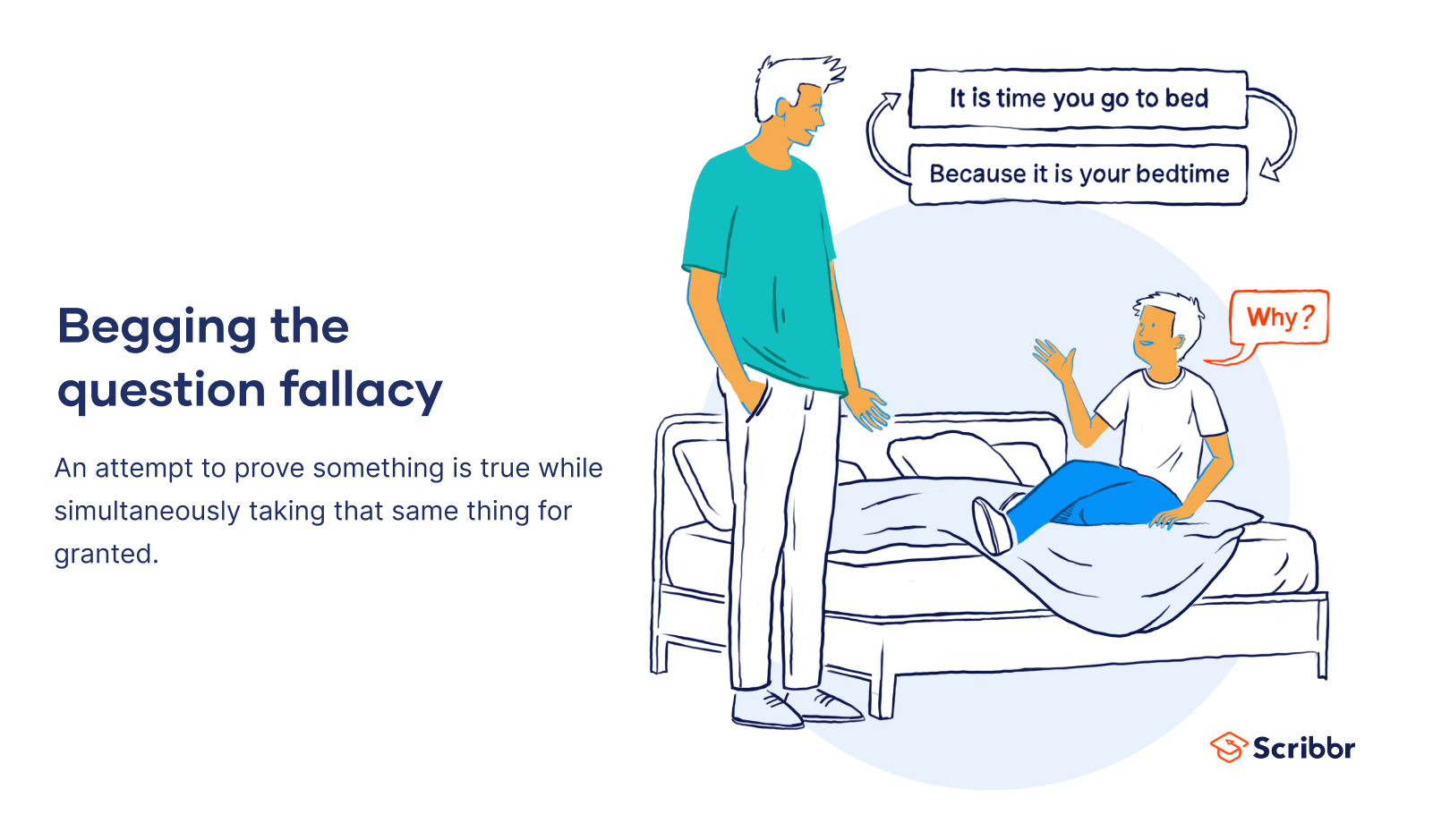Begging the Question Fallacy | Definition & Examples
Begging the question fallacy is an argument where the conclusion is assumed in one of the premises. It is an attempt to prove something is true while simultaneously taking that same thing for granted. This line of reasoning is fallacious because the assumption is not justified by any evidence.
In the example above, the conclusion (the belief in God is universal) validly follows from the premise (everyone believes in God), but only because the conclusion is simply a rewording of the premise. Here, we assume in the premise what we supposedly prove in the conclusion. This is a faulty line of reasoning, because you cannot assume what you are trying to prove.
What is begging the question fallacy?
Begging the question fallacy occurs when we use the claim we are trying to prove as a premise in order to prove the very same claim. In other words, we assume that a premise is true in order to justify an argument. Begging the question fallacy is also known as petitio principii (Latin for “assuming the original point”) or “chicken and the egg argument” and is generally considered a form of circular reasoning.
Begging the question is an informal logical fallacy. It is a logically valid but trivial argument in that it fails to prove anything beyond what is already assumed.
Because the same idea is repeated in the premise and the conclusion, arguments that beg the question can be persuasive and obscure the fact that a debatable claim is being presented as truth.
What does begging the question mean?
In informal, everyday use, the phrase “begging the question” is used in a very different sense, indicating an important question that has not been addressed yet and should be part of the discussion. For example, in an interview, an answer may lead to a follow-up question that the interviewer introduces by saying “This begs the question …” instead of “This raises the question …”
However, the formal meaning of begging the question is assuming the conclusion. Since the general understanding of “beg” is “ask,” people have reinterpreted the phrase beg the question as meaning “raise a question.”
Why is begging the question fallacy a problem?
In a good argument, the premises are plausible—that is, we are presented with sufficient evidence to believe the premises are true. There is also a logical connection between the assumptions presented in the premises and the final conclusion.
In begging the question fallacy, there is no independent evidence to support the premises; rather, the conclusion is used to support the premises and vice versa. This means that the parts of our argument depend on each other, forming a circle: our argument simply repeats itself and doesn’t prove anything. This is a problem because a good argument requires evidence that is not the argument itself.
Begging the question fallacy examples
Begging the question can be easy to spot in its simplest form, where the same idea is repeated almost word for word, but people often use more subtle ways.
“Communism will never succeed, because a system in which everything is owned in common can never work.”
Even so, arguments that beg the question can be persuasive when the audience is unaware of the fallacy or when it already shares the speaker’s viewpoint—what is known as confirmation bias.
“You’re overlooking the fact that abortion is murder. We should have laws against murder, and so we should have laws against abortion.”
The interviewee’s argument is:
Premise 1: Abortion is murder
Premise 2: We should have laws against murder
Conclusion: Therefore, we should have laws against abortion.
No one would disagree that laws against murder are necessary, but the real issue here is whether abortion is wrong in a way that would justify having laws against it. So the first premise is begging the question, because there is no evidence provided to justify the claim. It only assumes that abortion is murder.
Of course, someone who already agrees with the interviewee would not see any problem with the line of reasoning, because they are already convinced that this is true.
However, regardless of one’s own convictions, there is a difference between believing something is true and being able to justify it. In other words, there is a difference between the position itself and the arguments for that position. Being unaware of this distinction causes people to fall for begging the question fallacy.
Other interesting articles
If you want to know more about fallacies, research bias, or AI tools, make sure to check out some of our other articles with explanations and examples.
AI tools
Fallacies
Frequently asked questions about the begging the question fallacy
- What is the difference between circular reasoning fallacy and begging the question?
-
Although many sources use circular reasoning fallacy and begging the question interchangeably, others point out that there is a subtle difference between the two:
- Begging the question fallacy occurs when you assume that an argument is true in order to justify a conclusion. If something begs the question, what you are actually asking is, “Is the premise of that argument actually true?” For example, the statement “Snakes make great pets. That’s why we should get a snake” begs the question “Are snakes really great pets?”
- Circular reasoning fallacy, on the other hand, occurs when the evidence used to support a claim is just a repetition of the claim itself. For example, “People have free will because they can choose what to do.”
In other words, we could say begging the question is a form of circular reasoning.
- What is the difference between a complex question fallacy and begging the question fallacy?
-
The complex question fallacy and begging the question fallacy are similar in that they are both based on assumptions. However, there is a difference between them:
- A complex question fallacy occurs when someone asks a question that presupposes the answer to another question that has not been established or accepted by the other person. For example, asking someone “Have you stopped cheating on tests?”, unless it has previously been established that the person is indeed cheating on tests, is a fallacy.
- Begging the question fallacy occurs when we assume the very thing as a premise that we’re trying to prove in our conclusion. In other words, the conclusion is used to support the premises, and the premises prove the validity of the conclusion. For example: “God exists because the Bible says so, and the Bible is true because it is the word of God.”
In other words, begging the question is about drawing a conclusion based on an assumption, while a complex question involves asking a question that presupposes the answer to a prior question.
- What is a simple definition for begging the question fallacy?
-
Begging the question fallacy is an argument in which you assume what you are trying to prove. In other words, your position and the justification of that position are the same, only slightly rephrased.
For example: “All freshmen should attend college orientation, because all college students should go to such an orientation.”
Sources in this article
We strongly encourage students to use sources in their work. You can cite our article (APA Style) or take a deep dive into the articles below.
This Scribbr articleNikolopoulou, K. (2023, August 21). Begging the Question Fallacy | Definition & Examples. Scribbr. Retrieved November 3, 2023, from https://www.scribbr.com/fallacies/begging-the-question-fallacy/
Rivera, H. (2018). Begging the question. In R. Arp, S. Barbone, & M. Bruce (Eds.), Bad arguments. https://doi.org/10.1002/9781119165811.ch70

